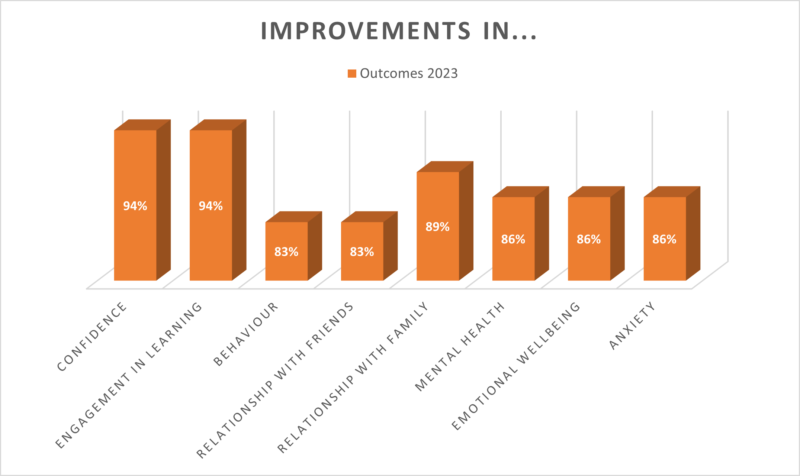Social Accounts
Each year or at the end of mentoring we ask our mentees, mentors, carers and teachers for feedback on the progression of the mentee throughout the year. These questions are based on the aims the organisation looks to achieve through mentoring, and enables us to create a mentoring journey for the young person.
Last year we mentored 316 distressed and vulnerable young people and thank you to all our mentors for their valuable work and the schools that we provide a service to. Here are our results with the pick of some fabulous feedback (names changed where necessary):
Social Accounts:

Mentee Feedback:
“I would like to continue. It gives me a chance to be myself and be away from my classmates. I have learned about respect, listening, concentration and focus, team work, patience, standing still and being calm. I have learned that improvement comes with practice, that I can have an ability to bounce back and not be scared of things that aren’t real. I know my mentor is there for me to share my feelings.”
“My mentor has helped me because she knows what to say and doesn’t judge. I feel like I can speak to her about anything.”
“It’s a relief to always have the option to speak to my mentor, it gives me peace of mind for when stuff may get difficult in which a calm, level headed unbiased response will help me calm down and not overthink if times do get tough.”
“Renee has helped me loads with my anger and confidence and made me help myself see things from a different perspective and I’m so grateful for her help.”
We have also started to ask the children this year if they feel there is a need for the service and if it’s useful for young people. They told us:
“I think it’s a great thing for young people who struggle with sadness and anxiety as it makes them feel heard.”
Mentor Feedback:
“We’ve made real progress and my mentee is definitely more resilient and robust.
What I did want to report back is that he is now using some of his new-found knowledge and skills to help his friendship group, particularly around relationships and change. This is evidence that Mentor Link helps the individual but that this in turn can have positive effects for a wider cohort.”
“Improved confidence so much, certainly knows who she is and her behaviour and anger have improved drastically. I have seen such an incredible transformation. C fully engaged in every session and it has been so amazing and fun working with her and watching her bloom and flourish.”
“E already has a great attitude to learning. I think she has improved how she deals with the competing priorities on her time, being proactive rather than reactive. She will seek help from teachers when needed. It sounds like there are positive and supportive relationships within the family.
E is in year 13 and aside from her A Levels is involved in a number of extra-curricular activities. She has been in similar positions before where juggling all the demands on her has been difficult (she is also a carer). I feel she now deals with the initial overwhelm and anxiety by working through priorities, identifying what she needs and asking for help. As a team leader for her House, she has been assertive with other team leaders rather than trying to do things herself or doing some of the tasks herself. She has improved in practicing self-care.
It is a pleasure being her mentor and to see her grow and develop.”
“It has been a delight working with him – made easier by the fact that he is always bubbly; happy to chat and tell me about football, school, his dog and his long term goals of being a footballer, passing his driving test first time and owning his own car. Thanks for the opportunity to mentor him. Fingers crossed I made a difference.”
Teacher Feedback:
“Please pass on my thanks to Bernie for all of her help and support; she certainly went over and above what could be expected in continuing to provide support within the home environment.”
“I just wanted to say how happy we are with the work Tom has done with C. When Tom picked C up we had regular suspensions and I was afraid down the line C might be a candidate for a permanent exclusion.
I am delighted to say that C’s attitude towards school has improved no end as has his behaviour and this I am sure is in no little part due to the work Tom has done with him.”
Carer Feedback:
“Hi Portia,
Please don’t downplay your part in his progress. He loves seeing you and his eyes light up when you ring to speak to him.
Just a bit of news to give you. The results of his mind year maths exam were announced yesterday. Lol, top of the class again with a lowly 98%, haha.😂😂. Not bad for a kid with ADHD.”